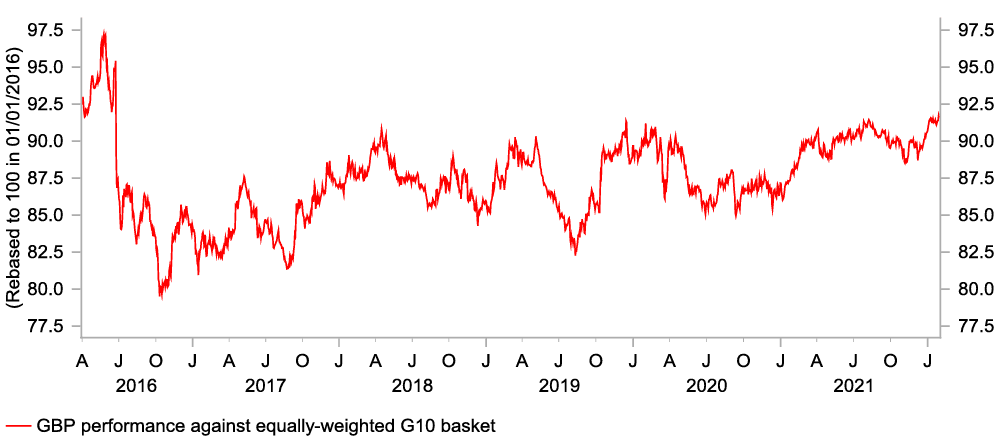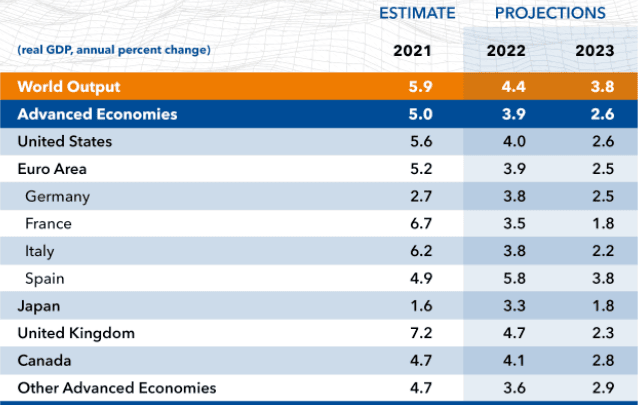Pound Sterling Trading at Multiyear Highs
- Written by: Gary Howes
- GBP riding high
- Helped by economic growth outperformance
- But could fade as year progresses
- As inflation, tax hikes weigh on consumers

Image © Pound Sterling Live
The British Pound has been bought by investors in anticipation of a Bank of England rate hike on Thursday February 03 which takes it to multi-year highs, but the UK currency could be challenged by economic disappointment later in the year say economists.
Gains were recorded by Sterling against both the Euro and Dollar at the start of the new month as investors positioned for a second Bank of England interest rate that would likely take Bank Rate to 0.50%.
"Pound trading at multiyear highs," says Derek Halpenny, Head of Research EMEA at MUFG. "The pound showed resilience at the start of 2022 and was the 3rd best performing G10 currency."
The below chart from MUFG shows the British Pound's performance as measured against an equally rate basket of the world's ten most liquid freely-traded currencies, confirming that the currency is potentially exiting its post-Brexit referendum range:

Above image courtesy of MUFG, data sources Bloomberg, Macrobond & MUFG GMR.
- Reference rates at publication:
Pound to Euro: 1.2000 \ Pound to Dollar: 1.3520 - High street bank rates (indicative): 1.1765 \ 1.3242
- Payment specialist rates (indicative): 1.1940 \ 1.3453
- Get a market-beating rate quote, here
- Set up an exchange rate alert, here
The Pound to Euro exchange rate is now near 1.20 making a near one percent advance in 2022 with Sterling also recording gains against all its G10 rivals.
Only the safe-haven Yen is recording a gain on the Pound while the Pound to Dollar exchange rate is flat on the year at 1.35.
Expectations for higher interest rates at the Bank of England are typically supportive of the Pound and reflects an admission that UK inflation is likely to remain elevated above 2.0% for some time.
The Bank will be emboldened to proceed with another interest rate hike as the economy appears to have exited the Omicron wave relatively unscathed.
"The speed in which the Omicron wave has passed through has raised optimism of a smaller Omicron impact with most restrictions now ended," says Halpenny.
"The UK economy is now bouncing back more strongly than other major developed economies," he adds.
The UK economy slowed during December and January according to surveys, but economists anticipate a strong bounce back in February as restrictions are lifted and self-isolation rates decline, allowing staffing levels to normalise and consumer confidence to increase.
The IMF said in its January 2022 World Economic Outlook that UK average GDP growth for 2021-22 was 5.95%, stronger than all other major advanced economies covered by the IMF.

Secure a retail exchange rate that is between 3-5% stronger than offered by leading banks, learn more.
Expectations for an economic rebound could allow the Bank of England to raise interest rates in February and signal further such hikes in coming months.
"The spotlight is now firmly on the BoE on Thursday: any indications hinting at a faster and more incisive normalisation/tightening path would support the pound against both the dollar and the euro," says Asmara Jamaleh, an economist with Intesa Sanpaolo.
But MUFG's Halpenny says the Bank of England will prefer to 'front load' rate hikes, meaning the ultimate level Bank Rate achieves in this cycle could be lower than would be the case were the Bank to pursue a sustained cycle of hikes.
"We see more front-loaded BoE action with an additional 25bp hike in May helping support GBP versus the euro but later in the year risks of slower growth could push the BoE to the sidelines and result in the pound reversing versus the euro," says Halpenny.
In a recent speech Bank of England Monetary Policy Committee member Catherine Mann said she would prefer to act on rates early to diminish inflation expectations amongst businesses, thereby limiting the prospect of an elevated 'terminal' Bank Rate.
Numerous economists we follow warn the UK economy might disappoint later in the year as consumer spending is pressured by elevated inflation and tax rises, prompting the Bank to step back from hiking rates.
{wbamp-hide start}
{wbamp-hide end}{wbamp-show start}{wbamp-show end}
Inflation could exceed 7.0% in the first half of the year following a sharp rise in utility bills expected in April, meaning the UK's workers are set to experience a significant loss of earning power.
OFGEM's price cap will be increased in recognition of the surging value of global gas prices, but the Bank fears these external issues could become anchored in domestic inflation expectations, thereby creating an inflationary cycle.
Furthermore analysts say fiscal policy will become a headwind to consumers as a hike to employee and employer National Insurance is introduced in April and income tax bands being frozen, which will result in many households paying higher taxes.
Economic challenges are expected to manifest moreso against the Euro than the Dollar over coming months show MUFG's forecasts, which recognise the Dollar's strong run will likely end this year.
MUFG forecasts the Euro to Pound exchange rate at 0.8250 by the mid-year mark and 0.8350 by year-end.
This gives an approximate Pound to Euro forecast of 1.2121 and 1.1976 respectively; they forecast the Pound to Dollar exchange rate at 1.3580 and 1.3890.





